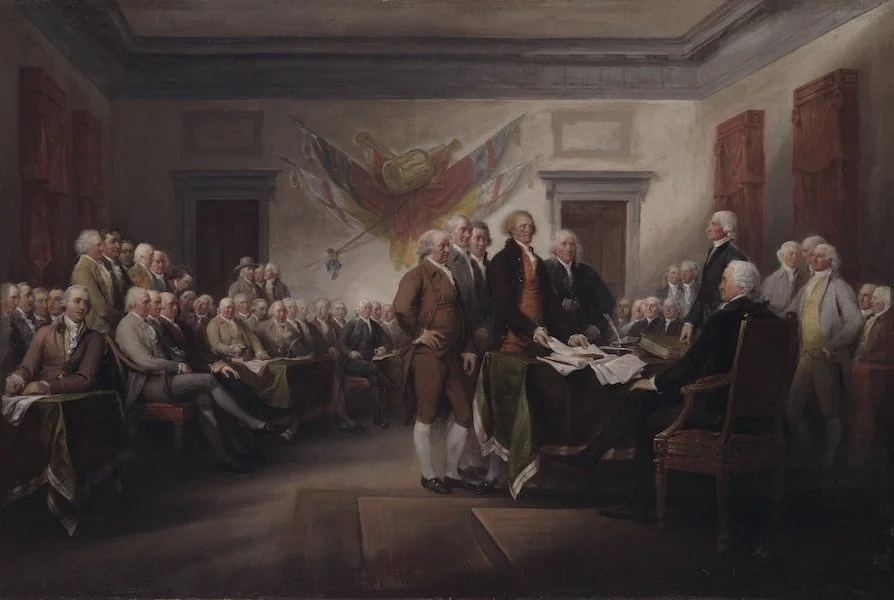America and Her God: A Theology of Nations
Nations and Their Origins
Towns and tribes, lords and lands—that has always been the rhythm of human life. According to the United States Bureau of Intelligence and Research, there are 197 sovereign nations in the world today. But the natural draw to form communities and protect boundaries is not a modern invention. From the very beginning, humanity has been drawn to tribes and towns, lands and rulers.
Genesis gives us the earliest account. God created Adam and Eve, placed them in the Garden, and commanded them to “be fruitful and multiply and fill the earth and subdue it” (Gen. 1:28). When they disobeyed, God expelled them from Eden and set a border. In effect, they were deported from their first home.
Soon, Cain followed a similar pattern. After murdering Abel, Scripture says, “Cain went away from the presence of the LORD and settled in the land of Nod, east of Eden” (Gen. 4:16). Movement, borders, and settlement became a rhythm of human history. People grouped into families, tribes, and eventually nations.
God Himself acknowledged this reality. To Abram He said, “Go from your country and your kindred and your father’s house to the land that I will show you” (Gen. 12:1). Notice what God recognized: Abram had a land and a people. Later, in Numbers 34–35, God gave Moses detailed instructions regarding Israel’s borders, assigning portions of land to tribes. These boundaries mattered, but they were never absolute. They were subject to God, who alone owns the earth: “The earth is the LORD’s and the fullness thereof, the world and those who dwell therein” (Ps. 24:1). The land belongs to God and can be distributed as He sees fit.
Nations exist, and nations matter—but they exist under the sovereignty of God.
Christ is Lord of All
The story does not end with nations. Scripture insists that over every nation, tribe, and tongue stands one King.
There is a sense in which earthly rulers are legitimate rulers. Donald Trump in the United States, Mark Carney in Canada, Claudia Sheinbaum in Mexico, King Charles III in England, Xi Jinping in China, Emmanuel Macron in France, Vladimir Putin in Russia—each one has a valid claim to authority. Yet their rule is limited and borrowed.
Jesus Himself told Pilate: “You would have no authority over me at all unless it had been given you from above” (John 19:11). Paul echoes this truth: “There is no authority except from God, and those that exist have been instituted by God” (Rom. 13:1). Earthly rulers wield real power, but it is derivative—it comes from God.
By contrast, Christ’s authority is original, unlimited, and supreme. “All authority in heaven and on earth has been given to me” (Matt. 28:18). Revelation calls Him “Lord of lords and King of kings” (Rev. 17:14). His reign does not depend on elections, constitutions, or armies. His throne is in heaven, and “his kingdom rules over all” (Ps. 103:19).
This means that Christ’s authority reaches into every realm of existence—the material world, the intellectual world, the moral world, the scientific world, the relational world. Abraham Kuyper, the Dutch pastor and statesman, put it well: “There is not a square inch in the whole domain of our human existence over which Christ, who is Sovereign over all, does not cry, Mine!”
Spheres of Authority
Kuyper also gave us a helpful framework for understanding how Christ’s reign operates in daily life: sphere sovereignty. Human society, he argued, is ordered into spheres—distinct realms of authority that are not interchangeable.
For simplicity, consider four:
Morality — authority over self
Family — authority over home
Church — authority over worship
State — authority over civic life
Each has its God-given purpose. Each is limited in scope. The family cannot govern the church, nor should the state dictate doctrine. Yet none of them stands outside Christ’s authority.
Kuyper explained that human rulers receive conferred authority, while Christ’s authority is acknowledged authority. That is, we may recognize Christ’s Lordship, but we cannot bestow it upon Him. He reigns regardless of our acknowledgment.
The problem arises when one sphere oversteps. The family can abuse its members. The church can distort doctrine. And the state—perhaps most often—can drift into tyranny. Kuyper warned that “the State… seeks to strengthen its arm, and with that outstretched arm opposes and attempts to break every aspiration of those spheres toward expansion.” The true purpose of the state, he insisted, is not to dominate but to “preserve and protect the integrity of each sphere.”
The American Experiment: Puritans and Pilgrims
These questions of church, state, and Christ’s authority are woven deeply into the fabric of American history.
The Mayflower set sail from Plymouth in September 1620 with 102 passengers—Separatists, Non-Conformists, and others fleeing the oppressive reach of the Church of England. Having first lived in exile in Leiden, they now sought freedom across the Atlantic.
William Bradford, their pastor and later governor, described the situation they left behind: “Religion has been disgraced, the godly grieved, afflicted, persecuted, and many exiled, while others have lost their lives in prisons and other ways; on the other hand, sin has been countenanced, ignorance, profanity, and atheism have increased, and the papists have been encouraged to hope again.”
Out of this suffering came one of America’s founding documents—the Mayflower Compact—which began: “Having undertaken, for the glory of God and advancements of the Christian faith and honour of our king and country, a voyage to plant the first colony in the northern parts of Virginia…”
Later, John Winthrop, governor of the Massachusetts Bay Colony, delivered his famous sermon “A Model of Christian Charity,” describing their community as a “city upon a hill” for the world to see and emulate.
In time, Jonathan Edwards and George Whitefield carried the torch of revival during the Great Awakening. Thousands came to faith, and even Benjamin Franklin was captivated by Whitefield’s preaching. These spiritual currents would eventually shape the politics of colonial America.
Separation of Church and State
Much confusion surrounds the phrase “separation of church and state.” Its earliest echoes came from Roger Williams, a Puritan pastor who described “a high wall between church and state to keep the wilderness of governments out of the affairs of religion.” The concern was not religious influence corrupting politics, but political power corrupting faith.
Later, Baptist pastor John Leland emphasized the independence of local churches, affirming a layered authority under God. Leland would later influence both James Madison and Thomas Jefferson.
Jefferson’s own use of the phrase came in his 1802 letter to the Danbury Baptists. Assuring them that government would not intrude into matters of conscience, he wrote: “I contemplate with sovereign reverence that act of the whole American people which declared that their legislature should ‘make no law respecting an establishment of religion, or prohibiting the free exercise thereof,’ thus building a wall of separation between Church & State.”
Jefferson’s intent was not to keep the church out of the state. He was not worried about religious influence over education or politics. Quite the opposite. Jefferson assured the Danbury Baptists that the State will not overextend their authority into matters of faith and doctrine. Jefferson was not trying to keep religion out of politics, he was protecting the church from the state.
Government Structures
Nations have experimented with many forms of government:
Anarchism — the absence of government, often leading to disorder.
Communism — centralized control eliminating private property in pursuit of classless society.
Monarchy — power vested in a king or queen, sometimes absolute, sometimes constitutional.
Oligarchy — rule by the wealthy or powerful few.
Democracy — rule by the people, usually through elected representatives.
Republic — a representative democracy governed by elected deputies.
Socialism — government control of production and distribution, often ending in elite dominance.
Theocracy — direct rule by religious law or religious authorities.
The United States, by design, is a constitutional federal republic—a system limited by written law, divided between states and federal power, with ultimate sovereignty resting in the voters.
Proverbs reminds us: “When the righteous are in authority, the people rejoice: but when the wicked rule, the people mourn” (Prov. 29:2). Elections provide liberty, but when liberty is used to empower “skunks, graspers, thieves, grifters, miscreants, villains, and stinkers” (to borrow Douglas Wilson’s words), liberty erodes into slavery.
Political Theology Through the Ages
Christians have long wrestled with how faith intersects with government. There are three kinds of political theologies that try to explain the church's role in culture.
Augustine taught the two cities—the city of man, defined by self-love, and the city of God, defined by love of God. Christians live as citizens of both, between the two worlds, awaiting the full unveiling of the city of God.
Luther taught the two kingdoms, distinguishing between civic and church government. Both were ordained by God, but they operated by different rules—natural law and the gospel.
Kuyper taught a transformational vision, that God desires to redeem all of creation and the church is already involved in the process. The cultural mandate of Genesis 1 and the Great Commission call believers to bring every sphere under Christ’s lordship.
Of these approaches, Kuyper’s vision resonates most with me. It affirms both Christ’s ultimate reign and the dignity of distinct human institutions. It insists that politics, science, art, family, and worship must all bend their knee to King Jesus.
Christ Over All
Nations rise and fall. Kings and presidents make laws and command armies. But Christ reigns above them all. His authority is not borrowed, fragile, or subject to election cycles. His reign is total, pervasive, and unshakable.
Christ is Lord because He is God, because He was perfectly obedient, and because He has been given all authority. Therefore, we are to obey Him in all ways, trust Him in all things, and proclaim Him in all places.
Abraham Kuyper’s reminder still rings true: “There is not a square inch in the whole domain of our human existence over which Christ, who is Sovereign over all, does not cry, Mine!”

